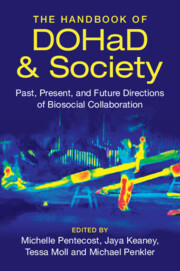Acknowledgements
This is a book about developmental origins and, as such, a book about how people and things grow in networks that provide nourishment and care. Similarly, this book is the product of the care, support, and commitment that many have provided. We are especially grateful for the generous support of our mentors, who offered encouragement and guidance on this mammoth undertaking. We offer special thanks to Mark Hanson, Lucilla Poston, Shane Norris, Maurizio Meloni, Megan Warin, Emma Kowal, Ruth Müller, and Fiona Ross. We also gratefully acknowledge the time and commitment of all of the handbook contributors, a diverse group of scholars who span six continents and who have all thoroughly engaged in the generous intellectual exchanges that have brought this handbook to fruition. Holding the space together have been four early-career scholars who have navigated the challenges of the contemporary academy alongside the challenges wrought by the COVID-19 pandemic and their own reproductive and kinship commitments. (Two babies were born in the intervening three years since the inauguration of this project, alongside other kin who were cared for and nurtured as we created this book.) From formative meetings in 2021 to writing this in 2023, this handbook is a product of imagination and planning, some good luck, and a deliberate collaborative and critical stocktaking of the DOHaD landscape.
We thank Nicholas Eppel for permission to use his artwork from the Thermal Optimum series as our cover image, and Stanley Ulijaszek for his role as workshop rapporteur – his reflections have been invaluable in corralling this interdisciplinary conversation. Many thanks also to Anna Whiting from Cambridge University Press, whose always helpful assistance as an editor was crucial in bringing this project to completion.
We acknowledge our funders. Michelle Pentecost is funded by a UKRI Future Leaders Fellowship (MR/T040181/1) and this book is open access courtesy of UKRI funding. Tessa Moll acknowledges funding through the Australian Research Council via a Future Fellowship Award (FT180100240, PI M. Meloni) and Discovery Research Award (DP200101270, PI A. Whittaker). Jaya Keaney was funded by an Australian Research Council Discovery Project Award (DP190102071, PIs E. Kowal, M. Warin, and M. Meloni). Michael Penkler was supported by the DFG German Research Foundation through the project ‘Situating Environmental Epigenetics’ (403161875, PI R. Müller).
Finally, we are grateful to our families for their support during the completion of this volume. Michelle Pentecost dedicates this work to Thomas and Julian Cousins. Jaya Keaney gratefully acknowledges Mariana Podesta-Diverio. Tessa Moll dedicates this work to Rasmus Bitsch and Aya Ukhanye Bitsch Moll. And Michael Penkler dedicates this book to Nevena and Malina Born-Penkler.

